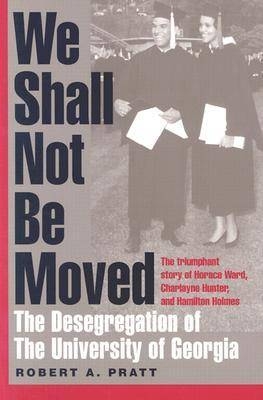
We Shall Not be Moved
The Desegregation of the University of Georgia
Seiten
2002
University of Georgia Press (Verlag)
978-0-8203-2399-2 (ISBN)
University of Georgia Press (Verlag)
978-0-8203-2399-2 (ISBN)
- Titel ist leider vergriffen;
keine Neuauflage - Artikel merken
In 1950, Horace Ward, an African-American student, applied to law school at the University of Georgia. However, he was bribed to go somewhere else. Beginning with Ward's unsuccessful application, this is account of the events surrounding the desegregation of Georgia's flagship institution.
In September 1950, Horace Ward, an African American student from La Grange, Georgia, applied to law school at the University of Georgia. Despite his impressive academic record, Ward received a reply - in reality, a bribe - from one of the university's top officials offering him financial assistance if he would attend an out-of-state law school. Ward, outraged at the unfairness of the proposition and determined to end this unequal treatment, sued the state of Georgia with the help of the NAACP, becoming the first black student to challenge segregation at the University of Georgia. Beginning with Ward's unsuccessful application to the university and equally unsuccessful suit, Robert A. Pratt offers a rigorously researched account of the tumultuous events surrounding the desegregation of Georgia's flagship institution. Relying on archival materials and oral histories, Pratt debunks the myths encircling the landmark 1961 decision to accept black students into the university: namely the notion that the University of Georgia desegregated with very little violent opposition.
Pratt shows that when Ward, by then a lawyer, helped litigate for the acceptance of Hamilton Earl Holmes and Charlayne Alberta Hunter, University of Georgia students, rather than outsiders, carefully planned riots to encourage the expulsion of Holmes and Hunter. Pratt also demonstrates how local political leaders throughout the state sympathized with - even aided and abetted - the student protestors. Pratt's provocative story of one civil rights struggle does not stop with the initial legal decision that ended segregation at the university. He also examines the legacy of Horace Ward and other civil rights pioneers involved in the university's desegregation - including Donald Hollowell and Constance Baker Motley - who continued for a lifetime to break color barriers in the South and beyond. We Shall Not Be Moved is a testament to Horace Ward, Hamilton Holmes, Charlayne Hunter-Gault, and others who bravely challenged years of legalized segregation.
In September 1950, Horace Ward, an African American student from La Grange, Georgia, applied to law school at the University of Georgia. Despite his impressive academic record, Ward received a reply - in reality, a bribe - from one of the university's top officials offering him financial assistance if he would attend an out-of-state law school. Ward, outraged at the unfairness of the proposition and determined to end this unequal treatment, sued the state of Georgia with the help of the NAACP, becoming the first black student to challenge segregation at the University of Georgia. Beginning with Ward's unsuccessful application to the university and equally unsuccessful suit, Robert A. Pratt offers a rigorously researched account of the tumultuous events surrounding the desegregation of Georgia's flagship institution. Relying on archival materials and oral histories, Pratt debunks the myths encircling the landmark 1961 decision to accept black students into the university: namely the notion that the University of Georgia desegregated with very little violent opposition.
Pratt shows that when Ward, by then a lawyer, helped litigate for the acceptance of Hamilton Earl Holmes and Charlayne Alberta Hunter, University of Georgia students, rather than outsiders, carefully planned riots to encourage the expulsion of Holmes and Hunter. Pratt also demonstrates how local political leaders throughout the state sympathized with - even aided and abetted - the student protestors. Pratt's provocative story of one civil rights struggle does not stop with the initial legal decision that ended segregation at the university. He also examines the legacy of Horace Ward and other civil rights pioneers involved in the university's desegregation - including Donald Hollowell and Constance Baker Motley - who continued for a lifetime to break color barriers in the South and beyond. We Shall Not Be Moved is a testament to Horace Ward, Hamilton Holmes, Charlayne Hunter-Gault, and others who bravely challenged years of legalized segregation.
ROBERT A. PRATT is an associate professor of history at the University of Georgia. He is the author of The Color of Their Skin: Education and Race in Richmond, Virginia, 1954-1989.
| Zusatzinfo | 10 b&w photographs |
|---|---|
| Verlagsort | Georgia |
| Sprache | englisch |
| Maße | 152 x 229 mm |
| Themenwelt | Geschichte ► Allgemeine Geschichte ► Zeitgeschichte |
| Geisteswissenschaften ► Geschichte ► Regional- / Ländergeschichte | |
| Sozialwissenschaften ► Pädagogik ► Erwachsenenbildung | |
| Sozialwissenschaften ► Politik / Verwaltung | |
| Sozialwissenschaften ► Soziologie | |
| ISBN-10 | 0-8203-2399-3 / 0820323993 |
| ISBN-13 | 978-0-8203-2399-2 / 9780820323992 |
| Zustand | Neuware |
| Haben Sie eine Frage zum Produkt? |
Mehr entdecken
aus dem Bereich
aus dem Bereich
Gewalt, Umwelt, Identität, Methode
Buch | Softcover (2024)
Spector Books OHG (Verlag)
36,00 €


